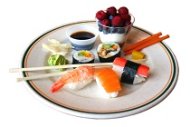More and more people are suffering from heart disease and clogged arteries. However the solution could be a simple and delicious fruit.
Cardiovascular disease kills more than 800,000 people in the U.S. alone annually. The usual cause for cardiovascular disease is atherosclerosis, which is the hardening and narrowing of the arteries which carry oxygen rich blood around the body.
These arteries become clogged with a ‘plaque’ which is a result of the build up of bad cholesterol, fat and calcium. This plaque hardens over time leading to heart attacks, strokes and other heart conditions.
However plaque can also build up in the arteries surrounding the kidney, brain, pelvis, arms and legs, all of which will lead to serious health issues.
The risk of atherosclerosis is raised by certain risk factors which we can control such as an unhealthy diet, smoking and a sedentary lifestyle, in addition to a genetic predisposition which we cannot control. Most experts admit the main treatment for atherosclerosis is lifestyle changes although medications are handed out which naturally have associated side effects.
New research has been carried out studying the effect of pomegranate extract on blocked arteries. The respected journal Atherosclerosis published the paper (i) which detailed a study undertaken on mice.
They added pomegranate extract to the drinking water of mice who were known to have a genetic propensity to spontaneous blockages of the coronary arteries. They started this when the mice were just three weeks old. Their results showed that “despite the fact that pomegranate treatment actually increased cholesterol levels associated with very low density lipoprotein-sized particles, the treatment both reduced the size of the atherosclerotic plaques in the aortic sinus (the dilated opening above the aortic valve) and reduced the proportion of coronary arteries with occlusive atherosclerotic plaques”
The study went on to detail further benefits which had been found with this simple addition of pomegranate extract. They include a “reduction in all of the following issues:
* levels of oxidative stress
* ECG abnormalities
* cardiac enlargement
* lipid accumulation in the heart muscle
* levels of monocyte chemotactic protein-1 and fibrosis in the myocardium
* macrophage infiltration in the heart muscle
* monocytie chemotactic protein-1, a chemical messenger (chemokine) associated with inflammatory processes within the arteries.”
* levels of oxidative stress
* ECG abnormalities
* cardiac enlargement
* lipid accumulation in the heart muscle
* levels of monocyte chemotactic protein-1 and fibrosis in the myocardium
* macrophage infiltration in the heart muscle
* monocytie chemotactic protein-1, a chemical messenger (chemokine) associated with inflammatory processes within the arteries.”
Indeed other studies have also shown the power of pomegranates to help clear this dangerous build up in arteries.
A three year study was carried out in Israel, with the results being published in 2004 in theClinical Nutrition journal (ii). They looked at the effect over three years on patients suffering from clogged arteries who drank pomegranate juice daily. They concluded that there was a reduction in the build up within the first year of 29%. In the same period the control group showed an increase in artery blockages of 9%.
The benefits of pomegranates in the treatment of cardiovascular disease is thought to be due to several inherent properties of the fruit and their effects on various functions within the body. Research has confirmed the following effects:
ANTIOXIDANT PROPERTIES – pomegranate has been shown to lower the oxidative stress in the blood in humans and mice (iii). It is the process of oxidation that converts the bad cholesterol into the dangerous plaque. The tests on mice showed a reduction in this oxidation process, which was reflected in a corresponding reduction of 44% in the arterial lesions. The report concluded that “pomegranate juice had potent antiatherogenic effects in healthy humans and in atherosclerotic mice that may be attributable to its antioxidative properties.”
ANTI-INFLAMMATORY PROPERTIES – inflammation is one of the root problems of many chronic diseases including cardiovascular disease. Several studies have proven the strong anti-inflammatory qualities of pomegranate´s (iv) with other diseases such as rheumatoid arthritis and osteoarthritis, colon cancer and inflammatory bowel disease responding to these properties.
ANTI-BACTERIAL and ANTI-VIRAL PROPERTIES – the plaque build up can often be worsened by additional bacterial or viral infections such as chlamydia pneumoniae and hepatitis C (v). Harnessing the anti-bacterial and anti-viral properties of pomegranate´s could minimize these effects.
BLOOD PRESSURE LOWERING PROPERTIES – studies have shown that pomegranate juice can reduce blood pressure (vi) and (vii) where diabetes or obesity is an issue. Also research has highlighted that pomegranate extract (known as PFE) is a rich source of punicalagin, a powerful anti-oxidant, and this has been found to reduce and even reverse the effects of “perturbed stress on arterial segments exposed to disturbed flow”
This is further proof that we can eat to heal ourselves, just as our ancestors did.
REFERENCES/SOURCE:
(i) http://www.greenmedinfo.com/article/pomegranate-extract-reduced-aortic-sinus-and-coronary-artery-aterosclerosis
(ii) http://www.greenmedinfo.com/article/pomegranate-reduces-intima-media-thickness-size-artery-while-also-reducing
(iii) http://www.greenmedinfo.com/article/pomegranate-juice-has-potent-antiatherogenic-effects-healthy-humans-and
(iv) http://www.greenmedinfo.com/greenmed/topic/18682/focus/5167/page
(v) http://www.greenmedinfo.com/article/hepatitis-c-and-chlamydia-pneumoniae-infection-are-related-progression-carotid
(vi) http://www.greenmedinfo.com/article/pomegranate-juice-reduces-blood-pressure-inhibiting-angiotensin-converting-enzyme-ace
(vii) http://www.greenmedinfo.com/article/influence-pomegranate-fruit-extract-comparison-regular-pomegranate-juice-and
(viii) http://www.greenmedinfo.com/article/pomegranate-fruit-extract-rich-punicalagin-reverses-proatherogenic-effects
http://www.greenmedinfo.com/blog/how-clean-your-arteries-one-simple-fruit
(i) http://www.greenmedinfo.com/article/pomegranate-extract-reduced-aortic-sinus-and-coronary-artery-aterosclerosis
(ii) http://www.greenmedinfo.com/article/pomegranate-reduces-intima-media-thickness-size-artery-while-also-reducing
(iii) http://www.greenmedinfo.com/article/pomegranate-juice-has-potent-antiatherogenic-effects-healthy-humans-and
(iv) http://www.greenmedinfo.com/greenmed/topic/18682/focus/5167/page
(v) http://www.greenmedinfo.com/article/hepatitis-c-and-chlamydia-pneumoniae-infection-are-related-progression-carotid
(vi) http://www.greenmedinfo.com/article/pomegranate-juice-reduces-blood-pressure-inhibiting-angiotensin-converting-enzyme-ace
(vii) http://www.greenmedinfo.com/article/influence-pomegranate-fruit-extract-comparison-regular-pomegranate-juice-and
(viii) http://www.greenmedinfo.com/article/pomegranate-fruit-extract-rich-punicalagin-reverses-proatherogenic-effects
http://www.greenmedinfo.com/blog/how-clean-your-arteries-one-simple-fruit
If you found this article useful, share it with family and friends by clicking the links below.
Ref: http://www.naturalcuresnotmedicine.com/clean-arteries-one-simple-fruit/

